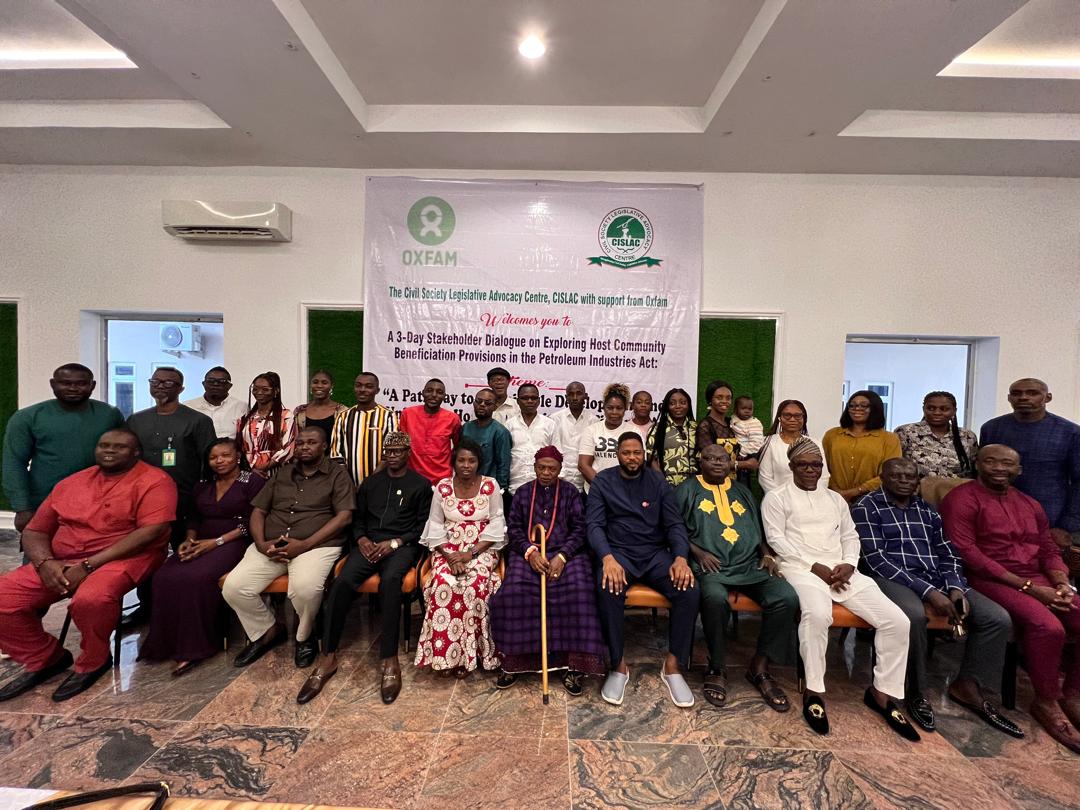
• Participants at the dialogue
By Itoro Bassey
A group of stakeholders has urged the Nigerian Upstream Petroleum Regulatory Commission (NUPRC) to address requests for transparency regarding the 3% Annual Operational Expenditure (OPEX) revenue paid by oil companies (settlors) to Host Community Development Trusts (HCDTs).
This request, according to them, aligns with the provisions outlined in the Petroleum Industry Act (PIA) and seeks clarity on how these funds are calculated.
The stakeholders, including Policy Alert, BudgIT Foundation, the Akwa Ibom State Government, and the Ibeno Youth Advocacy Network (IYAN) made the call at the end of a two-day dialogue focused on host community benefits under the PIA, held from October 8-9, 2024, at KINIZ Apartments in Uyo, Akwa Ibom State.
The event was themed “A Pathway to Sustainable Development and Unlocking Host Community Benefits in PIA.”
Speaking at the event organized by the Civil Society Legislative Advocacy Centre (CISLAC) with support from Oxfam in Nigeria, Mr. Mfon Gabriel, Executive Director of the Citizens Advocacy Centre, disclosed that many host communities with established Host Community Development Trusts (HCDTs) are unaware of the actual funds that have been allocated to the trust.
He pointed out that trust leaders often do not verify or challenge the amounts they receive as the 3% OPEX.
According to Section 240 (2) of the Petroleum Industry Act (PIA), oil companies (settlors) are required to contribute 3% of their actual annual operating expenditure (OPEX) from the previous financial year to the Host Communities Trust Fund to address the environmental and social impacts of oil exploration and production on host communities.
Gabriel, whose presentation focused on the structures and functions of the Host Community Development Trusts, also noted that, in addition to corruption in the budgeting and implementation of the Host Community Development Plan (HCDP) over the past year, there has been a significant lack of transparency regarding the amounts paid and received as 3% OPEX by the settlors, trust leaders, and even the regulators.
The forum also noted that the benefits intended for host communities have been appropriated by elites and leaders of the Host Community Development Trusts (HCDTs), including political figures, former oil company employees, and traditional leaders, resulting in the communities being deprived of the advantages of oil revenue.
In the communique released at the conclusion of the dialogue, the forum made several recommendations, including: “NEITI should disaggregate their data per asset for the HCDT as they did for CSR in the simplified 2024 Oil and Gas Industry Audit Report.
“The BOT and management committees of HCDTs should practice proactive disclosure of their data, especially on funds received, projects and programs implemented, beneficiaries, cost, contractors, etc.
“All HCDTs should set up a digital platform like a website to host all their data online to ease access and promote transparency. While awaiting the above, regulators should work with the court to ensure these fines imposed on settlors are imposed as and when due.
“Ministry of Environment should assist Ibeno, Mbo and Esit Eket HCDTs to address the issue of failure of TotalEnergies to set up HCDT in Akwa Ibom State. NUPRC should step in to address the issue above as Total Energy has no power by law to cherrypick which HCDT they can set up or not”.
“NUPRC should give disclosure of how the Gas Flare penalty of all settlors are being utilized to address ecological footprint. For example, the 21 million dollars paid by Mobil for Akwa Ibom State to address the ecological footprint in the host communities.
“Akwa Ibom State Government through the ministry of environment and mineral resources should prevail upon all HCDTs and settlors to furnish it with all relevant information of their operations”.
In her presentation titled “Nigeria F4A Context Analysis,” Precious Igboanugo, the OXFAM Project Assistant, emphasized the need for an open civic space for oil-producing communities in Akwa Ibom State.
She urged governments, the extractive industries, and the Host Community Development Trusts (HCDTs) to urgently reinvest the resources extracted from oil-bearing communities into essential sectors such as health, education, agriculture, and youth employment.
Earlier in his welcome address, Mr. Auwal Musa Rafsanjani, the Executive Director of CISLAC, called on members of the Host Community Development Trust (HCDT), oil companies, and governments in oil-producing states to actively involve host communities in the implementation of the Petroleum Industry Act (PIA).
Represented by Mr. Ayo Omowu, a senior programs officer at CISLAC, Rafsanjani stressed the importance of conducting needs assessments within the communities and incorporating the input of residents from the conception stage through to implementation to ensure transparency and accountability.
He highlighted that while the PIA offers significant potential for Nigeria’s oil-producing states, its success hinges on the effective execution of its provisions.
He urged the Nigerian government and oil companies to foster a cooperative relationship with host communities.
The workshop gathered 40 participants from across Akwa Ibom State, including representatives from Host Community Development Trusts (HCDTs) in Ibeno, Eket, Mbo, Esit Eket, Uruan, and Ikot Abasi, as well as members from the Akwa Ibom State Ministry of Environment/Mineral Resources, the National Oil Spill Detection and Response Agency (NOSDRA), civil society organizations (CSOs), and the media.